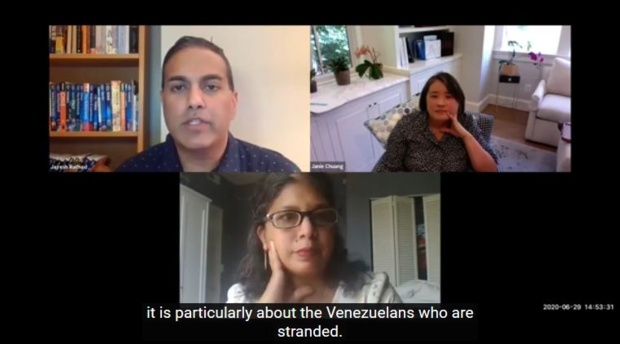Faculty Experts Shed Light on Impacts to U.S. Immigration During “WCL Faculty Speaks: Migration Law and Policy During the COVID-19 Pandemic”
June 30, 2020

On Monday, June 29, faculty experts at American University Washington College of Law addressed the current impacts on immigration during "WCL Faculty Speaks: Migration Law and Policy During the COVID-19 Pandemic."
American University Washington College of Law's “WCL Faculty Speaks" series covers key law and policy issues impacted by the COVID-19 crisis. The live webinars are hosted by Washington College of Law legal experts. Participants, and their areas of expertise, included:
- Professor and Associate Dean for Experiential Education Jayesh Rathod, director of the Immigrant Justice Clinic – Immigration Law, Labor and Employment Law, and Clinical Legal Education
- Professor Janie Chuang – International Human Rights/Humanitarian Law, Human Trafficking, and Labor Migration
- Assistant Professor Anita Sinha, director of the International Human Rights Law Clinic – International Human Rights/Humanitarian Law, Immigration Law, and Clinical Legal Education
Since the 19th century, health-related grounds of inadmissibility have been present in the nation’s immigration process, Rathod said.
“Under the current law, what we have is a series of subcategories that include people who have mental disorders, drug abusers, and, relevant to our conversation today, persons who have a ‘communicable disease of public health significance’ – that includes a quarantine-able disease, which includes coronavirus,” he said. Anyone applying for a permanent visa or green card must complete a health screening and medical test, often times with the DHS working conjunction with the CDC to screen migrants.
Outlining additional policy changes since the start of COVID, Rathod noted some are unilateral proclamations coming from the White House, while other decisions were the product of bilateral agreements between the U.S. and Canada and the U.S. and Mexico. Many of these new restrictions and exceptions raise questions from the public health standpoint, he said.
“If the goal of all of these exclusions is to truly to control public health, we have to think about how these exceptions are operating and how the administration is accounting for public health concerns,” said Rathod.
Chuang underscored that immigrants are disproportionately suffering from economic hardships of social distancing, falling victim at rapid rates to the virus, and becoming targets of discrimination in light of the pandemic. She also spoke about the extent at which migrant workers are overlooked by different global governments, citing Singapore’s failure to account for coronavirus cases among migrant workers and India’s shutdown of its transportation system as two stark examples.
“We’re also seeing a shift of migration rhetoric to include more of a health angle. Public discourse has framed for a long time migration as an international security issue focused on border security, and now we have this element of health security, being threatened by the presence of migrants,” Chuang said. “That’s informing some of the responses governments around the world have had, including the Trump administration, to migrant labor more generally.”
Before the pandemic more than 45,000 individuals were being detained by Immigration and Customs Enforcement (ICE) on a given day Sinha said. She noted that various facets of the detention experience are impacted by the ongoing pandemic, including releasing detainees that are medically vulnerable; the availability and use of hygiene and safety supplies; the transfer of detainees; and an overall lack of testing.
“DHS created a task force, reviewing detainees that are medically vulnerable, and ended up releasing about 900, but obviously there are many more in the U.S. that are medically vulnerable and should be released,” she explained. “Advocates have been filing more individual and group habeas petitions to get these detainees released.”
Learn more about AUWCL’s Immigration Law programs and initiatives here.